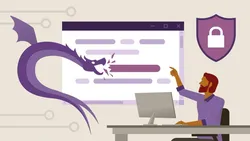
Kali Linux Tutorial For Beginners 
This course is designed to teach beginners the basics of Kali Linux, a powerful operating system used by hackers. You will learn about the history of Kali Linux, the different types of kernels, how to use the terminal, and how to write scripts to automate tasks. You will also learn about the Linux file system, IP address changing, and installing packages. By the end of this course, you will have the knowledge and skills to use Kali Linux in your journey to becoming an ethical hacker. ▼
ADVERTISEMENT
Course Feature
![]() Cost:
Cost:
Free
![]() Provider:
Provider:
Udemy
![]() Certificate:
Certificate:
No Information
![]() Language:
Language:
English
![]() Start Date:
Start Date:
On-Demand
Course Overview
❗The content presented here is sourced directly from Udemy platform. For comprehensive course details, including enrollment information, simply click on the 'Go to class' link on our website.
Updated in [May 25th, 2023]
Learn Kali Linux
What you'll learn:
What is Kali Linux
What is Linux
Understanding Fundamentals of Linux
What is Kernel
Types of Kernel
What is Desktop Environment
Understanding Shell/Console
How to download and install Kali Linux
Understanding Linux OS
Understanding the Linux File System
Using terminal
Installing Packages
Copy, moving, deleting the files in terminal
Changing the IP address
Learn how to do Shell Scripting
In this course, you will learn how to use the Kali Linux OS (designed for hackers) from scratch. We start this course from the basics stuff likes what is Kali Linux, what is Linux and what is meant by the word "Linux" anyway, who created it, a brief history of Kali Linux, What is Kernel, learn about the different types of the kernel, we also learn what is shell/console, types of shell, most commonly used shell nowadays, what is terminal, how we can use it for most of our operation in the Kali Linux OS, and why we need to learn the terminal does it is something that a hacker must know or just for a fun, and last but not least we are also going to learn about the scripting in the Kali Linux OS and creates our first script to automate our tasks.
There is a section dedicated to each topic in this course, so you don't have to worry about the topics is that you want to learn and master. As this course is for beginners so don't expect to go and hacker the most secure system/network after completing this course. This course is just designed to teach you what is Kali Linux OS and you can use it in your path of becoming an ethical hacker.
(Please note that we obtained the following content based on information that users may want to know, such as skills, applicable scenarios, future development, etc., combined with AI tools, and have been manually reviewed)
[Course title]: Abstract Watercolor
[Course description] Learn the basics of abstract watercolor painting and create beautiful works of art. This course will teach you the fundamentals of abstract watercolor painting, from the basics of color theory to the techniques of brushwork and layering. You will learn how to mix colors, create interesting textures, and use different tools to create unique effects. You will also learn how to use the elements of design to create a composition that is visually appealing. By the end of the course, you will have the skills and knowledge to create beautiful abstract watercolor paintings.
[Applications]
After completing this course, students will be able to understand the fundamentals of the Kali Linux OS and be able to use it for their own purposes. They will be able to install and configure the OS, use the terminal to perform various tasks, and create their own scripts to automate tasks. Additionally, they will be able to use the Kali Linux OS to perform basic security testing and penetration testing.
[Career Paths]
1. Ethical Hacker: Ethical hackers use their knowledge of computer systems and networks to identify potential security risks and vulnerabilities. They use their skills to protect organizations from malicious attacks and data breaches. As the demand for cyber security increases, ethical hackers are in high demand and the job outlook is very positive.
2. Penetration Tester: Penetration testers use their knowledge of computer systems and networks to identify potential security risks and vulnerabilities. They use their skills to test the security of an organization's systems and networks and provide recommendations for improving security. As the demand for cyber security increases, penetration testers are in high demand and the job outlook is very positive.
3. Cyber Security Analyst: Cyber security analysts use their knowledge of computer systems and networks to identify potential security risks and vulnerabilities. They use their skills to analyze an organization's systems and networks and provide recommendations for improving security. As the demand for cyber security increases, cyber security analysts are in high demand and the job outlook is very positive.
4. Network Security Engineer: Network security engineers use their knowledge of computer systems and networks to identify potential security risks and vulnerabilities. They use their skills to design, implement, and maintain secure networks for organizations. As the demand for cyber security increases, network security engineers are in high demand and the job outlook is very positive.
[Education Paths]
Recommended Degree Paths:
1. Bachelor of Science in Computer Science: This degree path provides students with a comprehensive understanding of computer science fundamentals, including programming, software engineering, computer architecture, and operating systems. It also covers topics such as artificial intelligence, machine learning, and data science. This degree path is ideal for those interested in pursuing a career in cybersecurity, as it provides the necessary skills and knowledge to develop secure systems and networks.
2. Bachelor of Science in Cybersecurity: This degree path focuses on the technical aspects of cybersecurity, such as network security, cryptography, and digital forensics. It also covers topics such as risk management, incident response, and ethical hacking. This degree path is ideal for those interested in pursuing a career in cybersecurity, as it provides the necessary skills and knowledge to protect systems and networks from malicious attacks.
3. Master of Science in Information Security: This degree path provides students with a comprehensive understanding of information security principles, including risk management, security architecture, and security operations. It also covers topics such as cryptography, digital forensics, and ethical hacking. This degree path is ideal for those interested in pursuing a career in cybersecurity, as it provides the necessary skills and knowledge to develop secure systems and networks.
Developing Trends:
1. Cloud Security: Cloud security is becoming increasingly important as more organizations move their data and applications to the cloud. This trend is expected to continue as cloud computing becomes more popular and organizations look for ways to protect their data and applications from malicious attacks.
2. Artificial Intelligence: Artificial intelligence is becoming increasingly important in the field of cybersecurity, as it can be used to detect and respond to threats more quickly and accurately. This trend is expected to continue as organizations look for ways to automate their security operations and reduce the risk of malicious attacks.
3. Internet of Things: The Internet of Things (IoT) is becoming increasingly popular, as more devices are connected to the internet. This trend is expected to continue as organizations look for ways to protect their connected devices from malicious attacks.
Pros & Cons

Good content

Free

Enlightening

Better than other courses

Low voice

Unintelligible English

Unclear audio

Uncomfortable accent
Course Provider

Provider Udemy's Stats at AZClass
Discussion and Reviews
0.0 (Based on 0 reviews)
Explore Similar Online Courses

How To Draw A Cute JELLYFISH • EASY Digital Art Tutorial

Cake Topper Techniques: Fondant Animals

Python for Informatics: Exploring Information

Social Network Analysis

Introduction to Systematic Review and Meta-Analysis

The Analytics Edge

DCO042 - Python For Informatics

Causal Diagrams: Draw Your Assumptions Before Your Conclusions

Whole genome sequencing of bacterial genomes - tools and applications

Learning Kali Linux

Learning Kali Linux on Windows


Start your review of Kali Linux Tutorial For Beginners